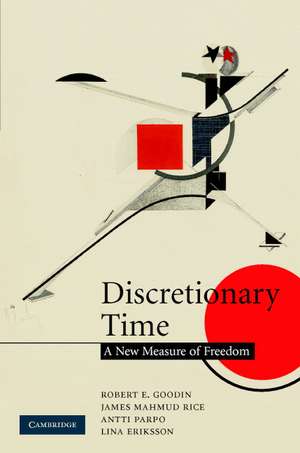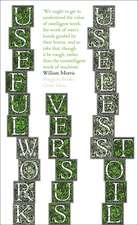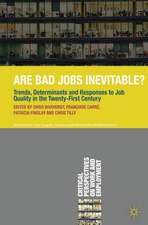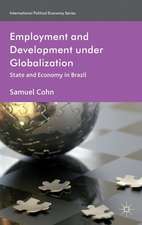Discretionary Time: A New Measure of Freedom
Autor Robert E. Goodin, James Mahmud Rice, Antti Parpo, Lina Erikssonen Limba Engleză Hardback – 20 feb 2008
| Toate formatele și edițiile | Preț | Express |
|---|---|---|
| Paperback (1) | 301.32 lei 6-8 săpt. | |
| Cambridge University Press – 20 feb 2008 | 301.32 lei 6-8 săpt. | |
| Hardback (1) | 696.58 lei 6-8 săpt. | |
| Cambridge University Press – 20 feb 2008 | 696.58 lei 6-8 săpt. |
Preț: 696.58 lei
Preț vechi: 782.68 lei
-11% Nou
Puncte Express: 1045
Preț estimativ în valută:
133.30€ • 138.38$ • 111.16£
133.30€ • 138.38$ • 111.16£
Carte tipărită la comandă
Livrare economică 25 martie-08 aprilie
Preluare comenzi: 021 569.72.76
Specificații
ISBN-13: 9780521882989
ISBN-10: 0521882982
Pagini: 482
Ilustrații: 41 b/w illus. 41 tables
Dimensiuni: 160 x 235 x 32 mm
Greutate: 0.88 kg
Ediția:New.
Editura: Cambridge University Press
Colecția Cambridge University Press
Locul publicării:Cambridge, United Kingdom
ISBN-10: 0521882982
Pagini: 482
Ilustrații: 41 b/w illus. 41 tables
Dimensiuni: 160 x 235 x 32 mm
Greutate: 0.88 kg
Ediția:New.
Editura: Cambridge University Press
Colecția Cambridge University Press
Locul publicării:Cambridge, United Kingdom
Cuprins
Part I. Introduction: 1. Time and money; 2. Discretionary time; 3. The distribution of discretionary time; Part II. Time Pressure: 4. Time pressure: a new problem?; 5. Time pressure: a new measure; 6. Is it really an illusion?; Part III. Welfare Regimes Matter: 7. How welfare regimes differ; 8. A temporal perspective on welfare regimes; 9. Welfare regimes and temporal autonomy; Part IV. Gender Regimes Matter: 10. How gender regimes differ; 11. A temporal perspective on gender regimes; 12. Gender regimes and temporal autonomy; Part V. Household Regimes Matter: 13. How household regimes differ; 14. The difference that household rules make; 15. The difference that states make; 16. Alternative household rules and temporal autonomy; Part VI. Conclusions: 17. Conclusions; Appendix 1. Methodology; Appendix 2. Data.
Recenzii
'Only a group of scholars led by Bob Goodin could be sufficiently intellectually daring to replace money with leisure time as the metric of welfare achievement. In an era in which 'time to stand and stare' becomes ever scarcer, this is a book on the impacts of public policy which really matters.' Francis G. Castles, University of Edinburgh
'Confronting Marx's capitalist 'realm of necessity' head on, Goodin and his co-authors replace money with time as the measure of freedom and ask: 'how much control do citizens of OECD countries have over their allotments of time?' Don't be intimidated by the numbers and tables - the result is a fresh view of cross-national inequities, replete with new recipes for reform.' Stephan Leibfried, University of Bremen and Head of the Research Center for Transformations of the State
'The conclusion of Discretionary Time, an academic text based on a wealth of data from OECD countries, is that most of us have no one but ourselves to blame for our time-scarce predicament. Time pressure, they argue, suggests compulsion.' Financial Times
'The book articulates its argument over roughly 450 pages … Its substantial length and technicalities go unnoticed, partly for the easily accessible language, partly for the neat and rational organization of the argument's frame … case studies … provide a wide and attractive empirical articulation for [the authors'] theoretical framework.' Journal of Economics and Philosophy
'Discretionary Time: A New Measure of Freedom is an interesting work of theory and policy … a notable work.' Political Studies Review
'This is a carefully thought-out and crafted book … with strong conceptual and methodological contributions indeed.' Feminist Economics
'This book makes fascinating reading and invites further questions.' Managing Leisure
'Confronting Marx's capitalist 'realm of necessity' head on, Goodin and his co-authors replace money with time as the measure of freedom and ask: 'how much control do citizens of OECD countries have over their allotments of time?' Don't be intimidated by the numbers and tables - the result is a fresh view of cross-national inequities, replete with new recipes for reform.' Stephan Leibfried, University of Bremen and Head of the Research Center for Transformations of the State
'The conclusion of Discretionary Time, an academic text based on a wealth of data from OECD countries, is that most of us have no one but ourselves to blame for our time-scarce predicament. Time pressure, they argue, suggests compulsion.' Financial Times
'The book articulates its argument over roughly 450 pages … Its substantial length and technicalities go unnoticed, partly for the easily accessible language, partly for the neat and rational organization of the argument's frame … case studies … provide a wide and attractive empirical articulation for [the authors'] theoretical framework.' Journal of Economics and Philosophy
'Discretionary Time: A New Measure of Freedom is an interesting work of theory and policy … a notable work.' Political Studies Review
'This is a carefully thought-out and crafted book … with strong conceptual and methodological contributions indeed.' Feminist Economics
'This book makes fascinating reading and invites further questions.' Managing Leisure
Notă biografică
Descriere
A novel study of how much control people have over their time and work-life balance.

















